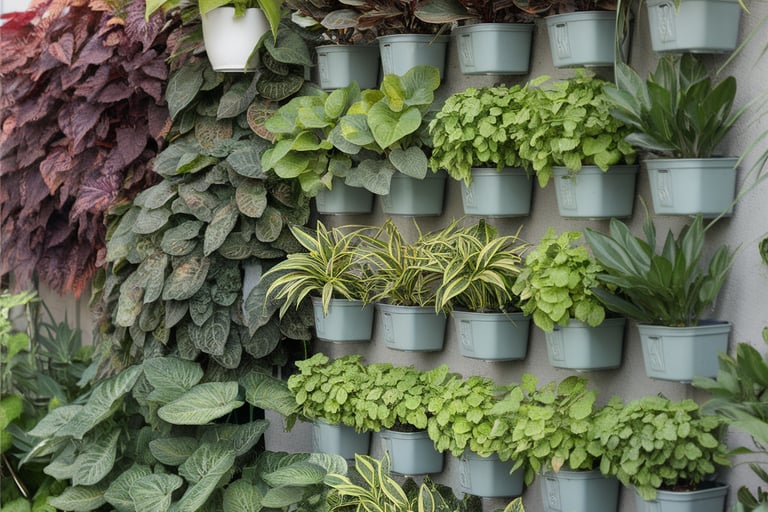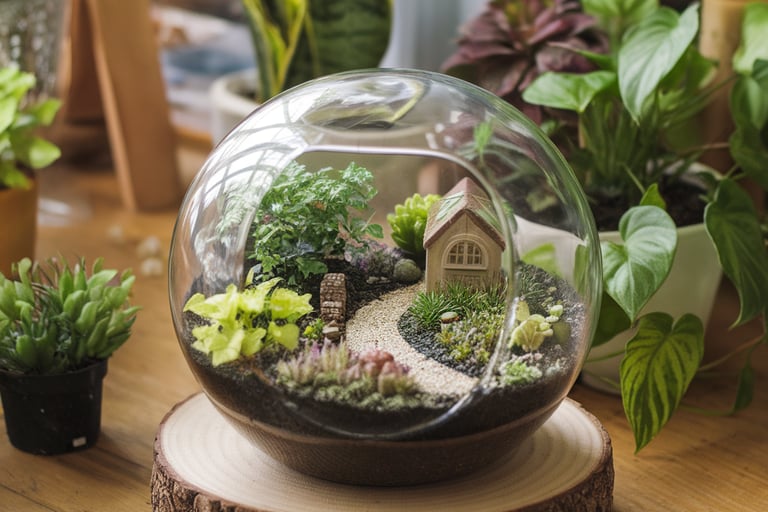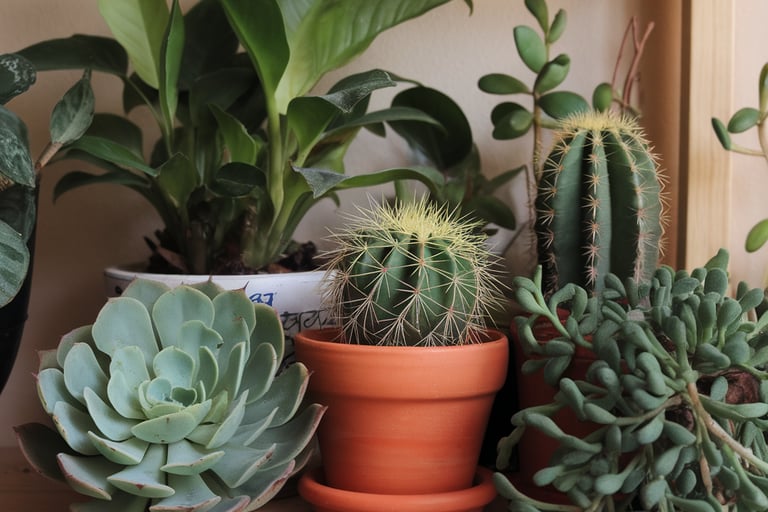
Small Space Gardening: Maximizing Your Vancouver Balcony or Patio
12/20/20246 min read
Living in Vancouver's urban landscape often means making the most of limited outdoor space. Whether you're in a downtown condo overlooking Coal Harbour or an apartment in Mount Pleasant, your balcony or patio can become a thriving garden oasis. With Vancouver's mild coastal climate and average annual rainfall of 1,189 mm, we're uniquely positioned to create successful small-space gardens that flourish year-round. At Blossom Landscaping we are experts at creating beautiful landscapes in any area, feel free to contact us to learn more.
The Rise of Vertical Gardening in Vancouver
Vancouver's housing market has led to an increase in condo living, making vertical gardening not just a trend but a necessity. According to the City of Vancouver's urban planning department, over 60% of new housing developments are multi-family units with limited outdoor space. This shift has sparked innovative solutions for maximizing growing space vertically, transforming how we approach urban gardening in our rainy coastal city.
Understanding Vancouver's Micro-Climate Challenges
Before diving into vertical garden solutions, it's essential to understand our local climate considerations. Vancouver's balconies and patios face unique challenges:
Wind Exposure
High-rise balconies, particularly those facing the water in areas like False Creek or English Bay, experience stronger winds than ground-level gardens. Working with local garden centers like GardenWorks can help you select wind-resistant plants and appropriate support systems for your vertical garden.
Rainfall Management
Our notorious rainfall requires careful planning for drainage systems. Unlike ground-level gardens where excess water naturally drains away, container gardens and vertical systems need proper drainage to prevent root rot. The experts at West Coast Seeds recommend specific soil mixes designed for container growing in our wet climate.
Light Conditions
Vancouver's winter months bring limited sunlight, while summer can create intense heat on balconies. Understanding your space's specific light patterns throughout the year is crucial for plant selection and placement.
Choosing the Right Vertical Garden System
Several vertical gardening systems work well in Vancouver's climate:
Living Wall Systems
Modern living wall systems, available at local suppliers like Art's Nursery, are designed to handle our wet winters and increasingly warm summers. These systems often include built-in irrigation and are perfect for north-facing balconies where space is at a premium.
Container Combinations
Stacking containers and utilizing tiered planters helps maximize space while ensuring proper drainage. Local company Vancouver Balcony Gardens specializes in custom solutions for small spaces, including self-watering containers that work well with our rainfall patterns.
Trellis and Support Systems
Installing weather-resistant trellises creates growing space for climbing plants. Cedar trellises, available from Vancouver's Lee Valley Tools, are naturally resistant to our wet conditions and can last for years with proper maintenance.
Plant Selection for Vancouver's Vertical Gardens
Choosing the right plants is crucial for success in our unique climate:
Year-Round Performers
For consistent greenery, consider native plants like Coastal Wood Fern (Dryopteris arguta) and Evergreen Huckleberry (Vaccinium ovatum). These species are adapted to our climate and provide year-round interest.
Seasonal Stars
Incorporate plants that shine in different seasons. Spring-flowering clematis, summer-blooming nasturtiums, and fall-color Japanese maples can create a dynamic vertical display throughout the year.
Edible Options
Vancouver's growing season allows for vertical vegetable gardening from March through October. Determinate tomato varieties, compact peas, and trailing strawberries are excellent choices for edible vertical gardens.
Seasonal Maintenance for Vancouver Vertical Gardens
Spring Preparation (March-May)
Vancouver's spring brings increasing daylight and temperatures, making it the ideal time to establish new plantings. Begin fertilizing when temperatures consistently reach above 10°C. Local garden expert Conway Lum from Mandeville Garden Centre recommends starting with a balanced, slow-release fertilizer suitable for container gardens.
Early spring is also the time to inspect irrigation systems and repair any winter damage. With Vancouver's average March rainfall of 114mm, ensuring proper drainage is crucial before the growing season begins.
Summer Care (June-August)
Despite Vancouver's reputation for rain, our summers have become increasingly dry. During July and August, when rainfall can drop to less than 40mm per month, consistent watering becomes critical. Install a drip irrigation system with a timer to maintain consistent moisture levels, especially for south-facing vertical gardens.
Temperature management is crucial during summer heat waves. Consider installing retractable shade cloths from local supplier BC Greenhouse Builders to protect sensitive plants during extreme heat events.
Fall Adjustments (September-November)
As Vancouver transitions to wetter weather, adjust watering schedules accordingly. Remove summer annuals and plant fall-winter specimens like ornamental kale and cyclamen. Local nursery Phoenix Perennials offers excellent selections of fall-winter plants suited for vertical gardens.
Winter Protection (December-February)
While Vancouver's winters are mild compared to the rest of Canada, occasional freezing temperatures require preparation. Install frost protection fabric for sensitive plants, particularly on exposed high-rise balconies where wind chill can be significant.
Space-Saving Design Solutions
Multifunctional Elements
Incorporate features that serve multiple purposes. Privacy screens can double as growing surfaces, while storage benches can support container plantings. Vancouver-based Kerrisdale Lumber offers weather-resistant cedar options perfect for custom solutions.
Vertical Herb Gardens
Create compact herb gardens using wall-mounted planters. Popular Mediterranean herbs like rosemary and sage thrive in Vancouver's climate and can be grown year-round with proper protection. The UBC Botanical Garden offers workshops on herb gardening specific to our climate.
Maximizing Light Exposure
Understanding seasonal sun patterns is crucial for Vancouver gardens. Use reflective surfaces to maximize limited winter light, and consider installing grow lights for dark corners. Local hydroponics supplier Holland Garden Store offers lighting solutions specifically designed for small spaces.
Container Selection and Soil Considerations
Choosing Weather-Resistant Containers
Select containers that can withstand Vancouver's freeze-thaw cycles. Fiber cement and thick plastic containers are ideal, while terra cotta may crack in winter. Local retailer Hunters Garden Centre offers a wide selection of weather-resistant options.
Soil Mix for Vancouver's Climate
Create a custom soil mix that provides both adequate drainage and moisture retention. A combination of:
50% high-quality potting soil
25% perlite for drainage
25% coconut coir for moisture retention
This mix helps manage both our wet winters and increasingly dry summers.
Water Management Systems
Install self-watering reservoirs and moisture meters to maintain consistent soil moisture. Local irrigation specialist NAKA Landscapes can design custom irrigation solutions for vertical gardens of any size.
Plant Recommendations for Vancouver's Vertical Gardens
Best Performing Perennials
Vancouver's climate allows for a diverse selection of perennial plants that thrive in vertical settings. Japanese Forest Grass (Hakonechloa macra) performs exceptionally well in our shaded areas, while Heuchera varieties offer year-round foliage interest and tolerate our wet winters. The experts at Southlands Nursery recommend these tried-and-tested varieties for vertical gardens.
Climate-Appropriate Climbers
For vertical coverage, consider hardy climbers like Hydrangea anomala petiolaris, which thrives in Vancouver's maritime climate. The self-clinging Virginia Creeper (Parthenocissus quinquefolia) provides stunning fall color and requires minimal support. These can be sourced from Cedar Rim Nursery, specialists in climbing plants for coastal BC.
Edible Vertical Gardens
Take advantage of Vancouver's long growing season by incorporating edibles into your vertical garden. Compact varieties of kale, Swiss chard, and leafy greens can produce from early spring through late fall. The Vancouver Farmers Markets often feature local growers who can provide advice on suitable vegetable varieties for container growing.
Troubleshooting Common Vancouver Garden Issues
Managing Pests in Urban Settings
Urban gardens face unique pest challenges. Aphids and spider mites can be particularly problematic in confined spaces. Work with GardenWorks to develop an integrated pest management strategy using beneficial insects and organic controls suitable for residential areas.
Dealing with Vancouver's Heavy Rainfall
Excess moisture can lead to fungal issues in vertical gardens. Improve air circulation by:
Installing small fans for air movement
Spacing plants appropriately
Using copper strips to deter slug activity
Consult with Art Knapp for specific products designed to combat moisture-related problems in vertical gardens.
Winter Protection Strategies
While Vancouver winters are mild, occasional cold snaps require preparation. Install clear polycarbonate panels from Rona to protect tender plants during freezing temperatures while maintaining light penetration. These can be easily removed during warmer months.
Sustainable Practices for Urban Gardening
Water Conservation
Despite our rainy reputation, Vancouver summers can be quite dry. Install a rain barrel system to collect winter precipitation for summer use. The City of Vancouver offers rebates for rain barrel installation and provides guidelines for proper setup.
Composting Solutions
Even small spaces can accommodate composting. Consider compact worm composting systems from City Farmer to create nutrient-rich fertilizer for your vertical garden while reducing waste.
Frequently Asked Questions
Q: How much maintenance does a vertical garden in Vancouver require?
A: Plan for weekly maintenance during the growing season (March-October) and monthly maintenance during winter. This includes regular watering, fertilizing, and pruning as needed.
Q: What are the best plants for a north-facing Vancouver balcony?
A: Shade-tolerant plants like ferns, hostas, and climbing hydrangeas perform well. Native plants such as Sword Ferns (Polystichum munitum) are particularly successful. Not types of trees generaly.
Q: How do I protect my vertical garden from Vancouver's winter storms?
A: Install wind breaks, secure all containers and trellises, and consider temporary clear plastic covers during extreme weather events.
Q: When is the best time to start a vertical garden in Vancouver?
A: Early spring (March-April) is ideal for establishing new plants, allowing them to develop strong root systems before summer heat or winter rains.
Q: How do I manage drainage in a vertical garden system?
A: Use well-draining soil mixes, ensure containers have adequate drainage holes, and consider installing a drip collection system to prevent water damage to your balcony or patio.
Ready to transform your small outdoor space into a thriving vertical garden? Visit our showroom or schedule a consultation with our vertical garden specialists. We'll help you design a sustainable, beautiful, and productive garden that works perfectly for your Vancouver space. Contact us today to start your vertical gardening journey.
Remember to check our blog for learning opportunities about vertical gardening techniques specific to Vancouver's unique climate and growing conditions.






Contact
Blossomscaping@gmail.com
+1-604-339-9217
© 2024. All rights reserved.
Where we service
3158 W 34th Ave, Vancouver, BC V6N 2S2
UBC - Cambie - Dunbar - West Vancouver - North Vancouver - West Point Grey - Shaughnessey - Richmond - Kerrisdale - South Vancouver - East Vancouver - Kitsilano - Burnaby - Mount Pleasant - Oakridge - Arbutus Ridge - Marpole - Southlands - Victoria-Fraserview


Proudly Servicing Vancouver, British Columbia
What we service
